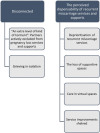'An extra level of kind of torment': Views and experiences of recurrent miscarriage care during the initial phases of COVID-19 in Ireland-A qualitative interview study
- PMID: 37300364
- PMCID: PMC10349219
- DOI: 10.1111/hex.13791
'An extra level of kind of torment': Views and experiences of recurrent miscarriage care during the initial phases of COVID-19 in Ireland-A qualitative interview study
Abstract
Introduction: Maternity services underwent much change during the COVID-19 pandemic. Research on the impact on miscarriage care and experiences during this time is sparse. Within a national evaluation of recurrent miscarriage care, we qualitatively explored stakeholder views and experiences of recurrent miscarriage services in Ireland. This study describes the impact of the COVID-19 pandemic on those experiences and perceptions of care.
Methods: People with professional and lived experience of recurrent miscarriage and service engagement were actively involved in this qualitative study from idea generation to analysis and reporting. We recruited women and men with two or more consecutive first-trimester miscarriages, and people involved in the management/delivery of recurrent miscarriage services and supports. We used purposive sampling to ensure that perspectives across disciplinary or lived experience, geographical, and health service administrative areas, were included. We conducted semi-structured interviews, virtually all due to COVID-19 restrictions, between June 2020 and February 2021. These were audio-recorded, and data were transcribed, and subsequently analyzed using reflexive thematic analysis.
Results: We interviewed 42 service providers and 13 women and 7 men with experience of recurrent miscarriage. We actively generated two central themes during data analysis. The first-'Disconnected'-describes how many women navigated miscarriage diagnosis and management and care in subsequent pregnancies alone; many felt that this resulted in increased trauma. At the same time, men struggled with not being present to support their partners and described feeling disconnected. The second theme highlighted 'The perceived dispensability of recurrent miscarriage services and supports'. Some service providers felt that service reduction and redeployment demonstrated a lack of value in the service. Virtual clinics facilitated access to services, but a preference for in-person care was highlighted.
Conclusion: Our analysis provides rich insights into the significant impacts that the COVID-19 pandemic has had on the way recurrent miscarriage care is provided and experienced, with important implications for early pregnancy, miscarriage and recurrent miscarriage care. Services have undergone significant changes and, while these may be temporary, how services should be delivered in the future requires consideration, particularly given the deficits in care and care experiences highlighted prepandemic.
Patient or public contribution: Members of the multidisciplinary RE:CURRENT Project Research Advisory Group (including four parent advocates, two of whom are co-authors on this article) were actively involved throughout the study, including the generation of topic guides and the refining of themes.
Keywords: COVID-19; maternity care; miscarriage; pregnancy loss; qualitative; recurrent miscarriage.
© 2023 The Authors. Health Expectations published by John Wiley & Sons Ltd.
Conflict of interest statement
The authors declare no conflict of interest.
Similar articles
-
How we define recurrent miscarriage matters: A qualitative exploration of the views of people with professional or lived experience.Health Expect. 2022 Dec;25(6):2992-3004. doi: 10.1111/hex.13607. Epub 2022 Sep 26. Health Expect. 2022. PMID: 36161882 Free PMC article.
-
Lived experience of recurrent miscarriage: women and their partners' experience of subsequent pregnancy and support within an NHS specialist clinic - a qualitative study.BMJ Open. 2023 Dec 20;13(12):e075062. doi: 10.1136/bmjopen-2023-075062. BMJ Open. 2023. PMID: 38123186 Free PMC article.
-
The experiences of men following recurrent miscarriage in an Irish tertiary hospital: A qualitative analysis.Health Expect. 2022 Jun;25(3):1048-1057. doi: 10.1111/hex.13452. Epub 2022 Mar 3. Health Expect. 2022. PMID: 35243718 Free PMC article.
-
A review of reproductive outcomes of women with two consecutive miscarriages and no living child.J Obstet Gynaecol. 2019 Aug;39(6):816-821. doi: 10.1080/01443615.2019.1576600. Epub 2019 Apr 22. J Obstet Gynaecol. 2019. PMID: 31006300 Review.
-
Maternity care during COVID-19: a qualitative evidence synthesis of women's and maternity care providers' views and experiences.BMC Pregnancy Childbirth. 2022 May 26;22(1):438. doi: 10.1186/s12884-022-04724-w. BMC Pregnancy Childbirth. 2022. PMID: 35619069 Free PMC article.
Cited by
-
Effects of the COVID-19 pandemic on working conditions of maternity staff - a scoping review.BMC Pregnancy Childbirth. 2025 Aug 14;25(1):855. doi: 10.1186/s12884-025-07905-5. BMC Pregnancy Childbirth. 2025. PMID: 40813979 Free PMC article.
-
Views of knowledge users on recurrent miscarriage services and supports in the Republic of Ireland: a qualitative interview study.BMJ Open. 2025 Apr 10;15(4):e094753. doi: 10.1136/bmjopen-2024-094753. BMJ Open. 2025. PMID: 40216432 Free PMC article.
References
Publication types
MeSH terms
Grants and funding
LinkOut - more resources
Full Text Sources
Medical


